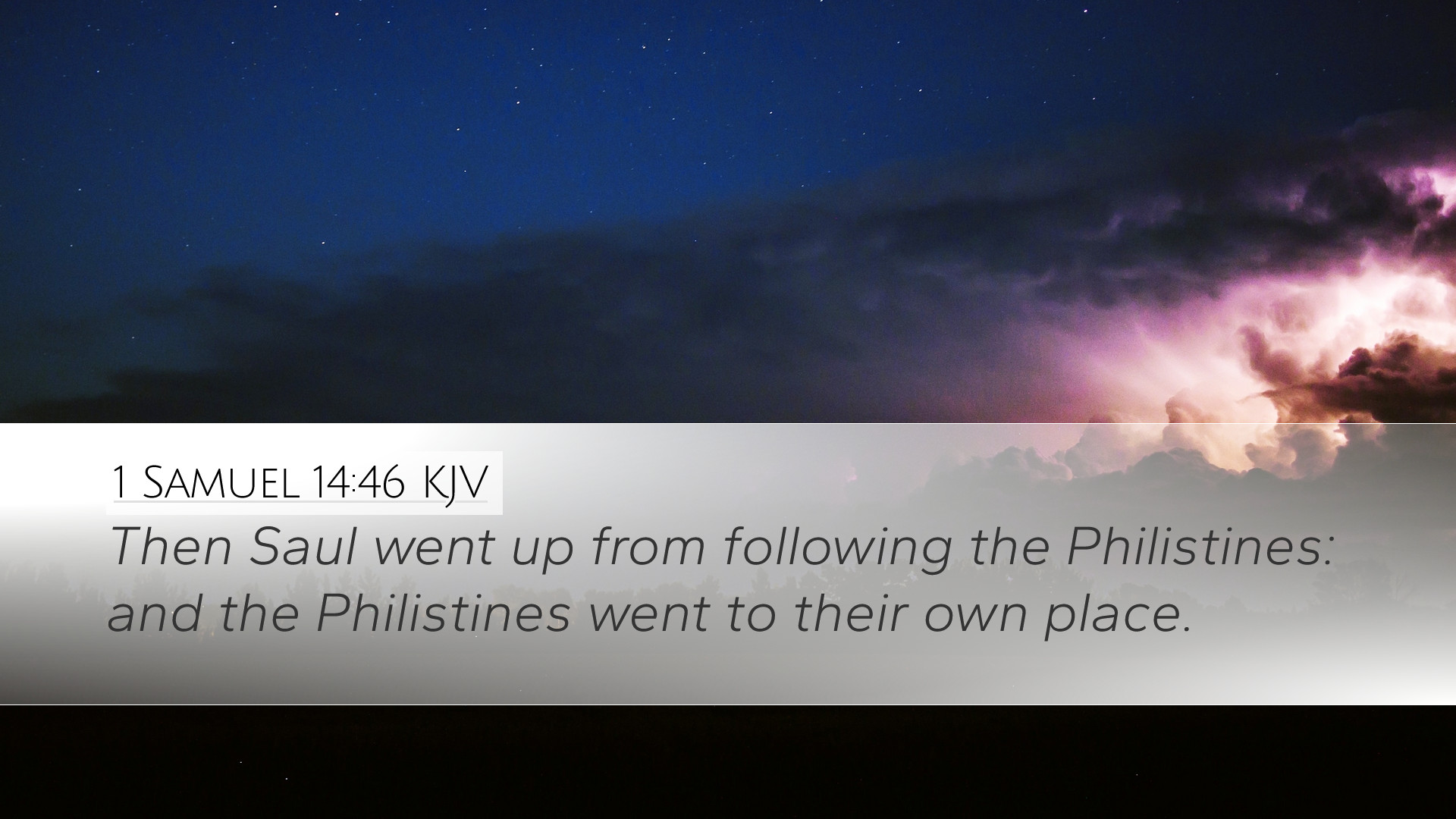Commentary on 1 Samuel 14:46
The verse 1 Samuel 14:46 reads: "Then Saul went up from following the Philistines: and the Philistines went to their own place." This passage marks a significant moment in the ongoing conflict between the Israelites, led by King Saul, and the Philistines. The historical and theological implications of this verse necessitate a detailed exploration of its context, language, and the commentary of revered biblical scholars.
Contextual Overview
To fully understand 1 Samuel 14:46, one must consider the preceding events. The chapter recounts a pivotal battle where Saul's son, Jonathan, demonstrates faith and valor against the Philistines, igniting a chain reaction that leads to a great victory for Israel. Following Jonathan's courageous actions, a divinely orchestrated confusion among the Philistines results in their retreat. Thus, Saul's decision to cease pursuit and return underscores a moment of both military strategy and spiritual reflection.
Insights from Biblical Scholars
Matthew Henry's Commentary
Matthew Henry highlights the providence of God in this passage. He notes that the Philistines' departure signifies a divine intervention that emboldens the Israelites. Henry emphasizes that Saul's withdrawal, although it might seem like a retreat, indicates a recognition of divine timing. He remarks on Saul's leadership and the need for discernment in military engagements, suggesting that Saul knew when to press the advantage and when to consolidate his forces. Henry encourages readers to perceive this moment as a lesson in reliance upon God rather than mere human strategy.
Albert Barnes' Commentary
Albert Barnes elaborates on the implications of Saul's actions. He argues that Saul’s retreat should not be misconstrued as cowardice but as a tactical withdrawal. Barnes emphasizes the importance of understanding the nature of leadership—prioritizing the long-term welfare of the nation over immediate glory. He also draws attention to the fact that the Philistines, despite their recent defeat, were still a looming threat; thus, Saul's decision to lead his men back further affirms the necessity for preparing for future encounters. According to Barnes, the cessation of pursuit speaks volumes about the challenges of governance in a tumultuous period.
Adam Clarke's Commentary
Adam Clarke approaches this passage with a focus on the repercussions of Saul’s leadership choices, which often reflects a duality of faith and fear. He notes that while the Israelites experienced a fleeting victory, the Philistines had not been decisively defeated. Clarke asserts that this moment captures the precarious balance within Saul’s reign—an inclination towards obedience to divine guidance juxtaposed with his human frailties. He invites readers to consider the implications of Saul’s decision in the larger narrative of Israel’s history, suggesting that it serves as a foreshadowing of Saul’s eventual downfall due to his failure to fully commit to God’s directions.
Theological Implications
The withdrawal of Saul as depicted in 1 Samuel 14:46 speaks to various theological themes, particularly regarding leadership, divine providence, and the nature of human authority in relation to God's will. The verse illustrates how God orchestrates events for the benefit of His people, reminding leaders of their need for dependence on divine wisdom.
-
Divine Sovereignty: The narrative emphasizes that victories are ultimately orchestrated by God, not merely by human effort or strength. Saul's retreat indicates a moment of turning faith towards God's future plans rather than chasing fleeting success.
-
Leadership Responsibility: Saul's decision-making reflects the heavy burden of leadership. It hints at an understanding of when to act and when to wait—skills that are crucial for any leader, especially in spiritual matters.
-
Human Fallibility: The passage serves as a reminder of Saul's complex character. He experiences moments of faith and obedience, yet his eventual shortcomings illustrate the dangers of relying on personal ambition rather than divine guidance.
Lessons for Today
For modern pastors, theologians, and students of the Scriptures, 1 Samuel 14:46 offers valuable lessons. The nature of leadership in faith contexts necessitates a continual seeking of God's will. The importance of discernment in decision-making is paramount, as is the understanding that victories in the Christian life often require humility and recognition of divine sovereignty over our endeavors.
This passage reinforces the need for leaders to pursue God's directions actively, to understand the reality of spiritual warfare, and to be aware that not every retreat is a sign of failure. It encourages reflection on personal motives and ambitions, challenging contemporary believers to evaluate how they lead in their own ministries and communities.
Conclusion
In conclusion, the significance of 1 Samuel 14:46 transcends its historical context, inviting deeper spiritual reflection and engagement with the principles of leadership, faith, and divine timing. Through the insights of scholars like Matthew Henry, Albert Barnes, and Adam Clarke, contemporary readers are equipped with profound wisdom regarding the dynamics of faith-filled leadership amid challenges.


